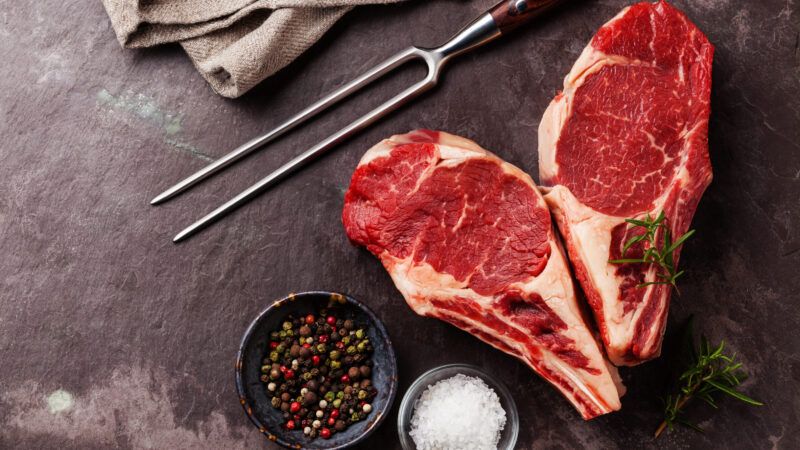Biden's Stimulus Bill Subsidized Meat Producers. Now, the White House Blames 'Corporate Greed' for High Meat Prices.
Is America's meat processing industry making huge profits by "jacking up prices" during a pandemic, or does it need government assistance? Both, according to the Biden administration.

White House Press Secretary Jen Psaki has a theory about why Americans are paying higher prices these days at the grocery store.
"The president [and] the secretary of agriculture have both spoken to what we've seen as the greed of meat conglomerates," Psaki told reporters at the White House's daily briefing on Tuesday. "The prices are higher. That is, in his view and in the view of our secretary of agriculture, because of—you could call it corporate greed, sure. You could call it jacking up prices during a pandemic."
Alas, Sen. Elizabeth Warren's (D–Mass.) debunked and widely mocked claims about corporate greed being the cause of inflation have apparently made their way into the White House's official talking points.
The whole idea is patently absurd on its face. Psaki wants Americans to believe that these shadowy "meat conglomerates" were simply not very greedy for the past 30 years—during which time inflation has been relatively low—but now have suddenly become very, very greedy in the past six months.
By that same flawed logic, Walmart could have been far more successful over the past few decades by jacking its prices through the roof rather than by delivering lower prices than most of its competitors. But that's obviously not true of Walmart (or any other successful firm). High prices, by their very nature, nudge consumers to buy less than they otherwise would. Inflation isn't great news for businesses that make money by selling things.
But the real cherry on top of this sundae of terrible economic analysis is that the Biden administration just got done dumping $600 million worth of new subsidies into the meat industry.
The American Rescue Plan, the $1.9 trillion stimulus package Biden successfully urged Congress to pass earlier this year, contained $500 million to "expand processing capacity and increase competition in meat and poultry" industries, according to the U.S. Department of Agriculture. Then, earlier this month, the Department of Agriculture extended another $100 million in loan guarantees to "expand meat and poultry processing capacity" along with other "food supply chain infrastructure."
Is America's meat processing industry run by a bunch of greedy corporate fat cats lining their own pockets with the proceeds of higher prices, or is the industry in such dire straits that it requires taxpayers to spend even more money subsidizing necessary upgrades? Why not both, the Biden administration seems to be saying.
The White House's main motivation here, of course, is to deflect attention away from its own role in creating the ongoing inflationary spiral—a problem that voters now say is the most important issue the country faces. Economists warned that the $1.9 trillion American Rescue Act was too large and could overheat the economy, but Democrats passed it anyway.
Other factors influencing inflation, like the disconnect between supply and demand that's largely a result of the ongoing COVID-19 pandemic, are well beyond Biden's (or any president's) power to change. When it comes to meat prices, one of those outlying factors is a massive drought in the western U.S. that has caused beef herds to shrink and the average cow to be 15 pounds less meaty when it is slaughtered. Another factor is the ongoing pandemic-related staffing problems at meat-packing plants, which are operating less efficiently even when fully staffed because they have to take necessary precautions to limit COVID-19 outbreaks that could cause even bigger disruptions.
Throwing $500 million in taxpayer cash at the meat industry isn't going to fix those problems. Blaming the meat industry's "greed" for "jacking up prices"—while actively throwing taxpayer money at the same meat industry—won't do it either.
This entire episode is yet another lesson in why it's folly to trust government officials to run the economy.
